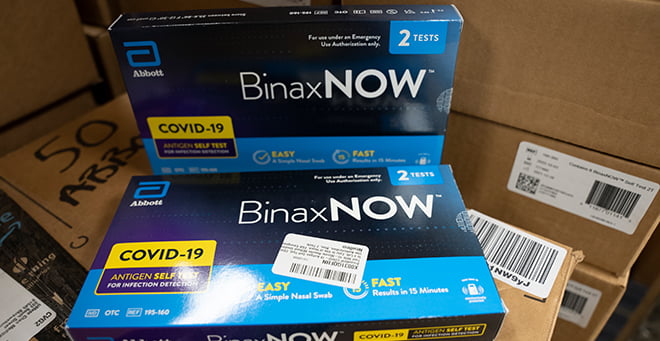At-home antigen tests performed similarly in detecting omicron and delta SARS-CoV-2 variants in comparison to polymerase chain reaction (PCR) tests and remain valuable tools to inform people of their infection status quickly, according to a study authored by UMass Chan Medical School and associated researchers supported by the National Institutes of Health (NIH) Rapid Acceleration of Diagnostics (RADx) initiative. The research appeared in medRxiv, a preprint online platform, and has not yet been peer reviewed.

a prospective cohort study that is part of NIH’s RADx initiative,
Test Us At Home.
While early reports suggested decreased and delayed sensitivity of at-home antigen tests in detecting the omicron variant in comparison to PCR tests, the new study finds that those reports may have been overstated. In fact, this analysis found that at-home antigen tests performed slightly better in detecting omicron variant infections, versus delta, within 48 hours of testing positive on a molecular PCR test.
Prior to the emergence of the omicron variant, studies found that at-home antigen tests have a lower sensitivity than PCR tests for detecting SARS-CoV-2 virus during early stages of infection. Higher sensitivity with at-home antigen tests can be achieved through serial testing (testing every few days).
“I think in the lay media, there is a lot of attention being paid to some of the early reports suggesting a greater delay between PCR tests (showing omicron infection) and at-home antigen tests. But most of these reports are based on a study comparing antigen tests using nasal swabs with PCR tests using saliva samples; but saliva tests are not used commonly,” said Apurv Soni, MD, PhD’21, assistant professor of medicine and principal investigator on the study. “That’s where our study is different because we’re comparing the same sampling technique, nasal swabs for both PCR and at-home tests, which is widely used across the country.”
The current analysis used data from 5,726 participants in a prospective cohort study that is part of NIH’s RADx initiative, Test Us At Home. Participants took an at-home antigen test using retail test kits available in the United States and collected a sample for a comparator molecular PCR test, using nasal swabs for both types of test samples. They tested themselves every 48 hours for 15 days. Testing took place from October 2021 through January 2022, spanning both delta and omicron infection waves.
Researchers assessed differences in performance of at-home antigen tests for detecting delta and omicron variants by measuring two factors: the likelihood of a positive result from an at-home antigen test compared with a PCR test, and the likelihood of a participant testing positive on an at-home antigen test based on the number of days since the first positive PCR test. Investigators also factored in a measure reflecting the level of virus present in a sample, so they could compare how the different test methods performed for a given viral load.
During the test period, 281 participants tested positive for SARS-CoV-2 using PCR testing. Two-thirds of these positive tests were the omicron variant and one-third were delta. Overall, 82 percent of delta-infected individuals and 92 percent of omicron-infected individuals tested positive by at-home antigen test within 48 hours of their first positive PCR test.
Dr. Soni said, “So, in a world where there is still a testing shortage and PCR tests could take days to get results, at-home antigen tests perform relatively well delivering results in 15 minutes or less and offer a tool that’s helpful to bring the surge volumes down. As we prepare for the next surge, I think some of this data shows that at-home antigen tests should be a critical tool used in the response.”
“I think it gives us some peace of mind,” said Nathaniel Hafer, PhD, assistant professor of molecular medicine and lead investigator of the RADx Tech Clinical Studies Core Logistics Team. “With omicron, there was a lot of stress about the number of new mutations, which led to scare over increased spread because omicron multiplies very quickly in the body. Even despite these things, there are tools at our disposal that are still useful in detecting infections, which is reassuring.”
Related UMass Chan new stories:
New studies to test performance of home COVID-19 tests for omicron
RADx Tech program researchers ramp up rapid home COVID-19 test studies